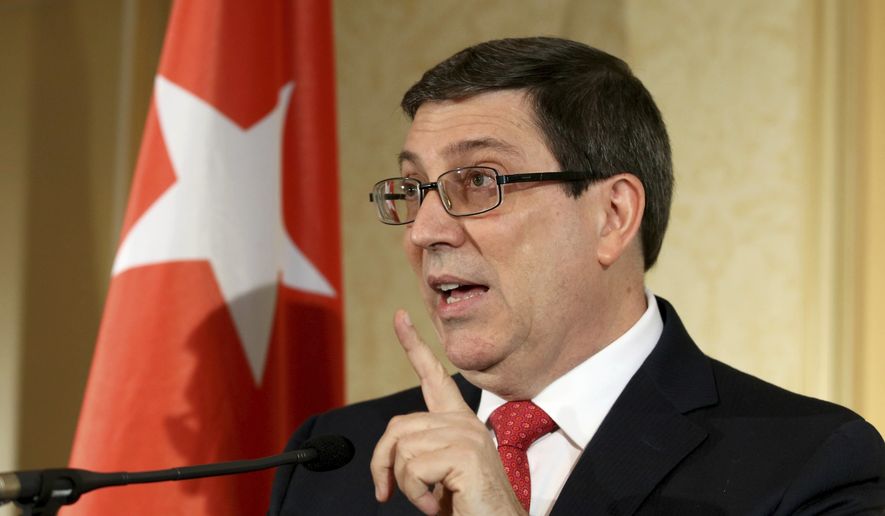In the Castro regime’s first response since President Trump announced new curbs on relations with the island last week, Cuban Foreign Minister Bruno Rodriguez Parrilla accused Mr. Trump of returning to Cold War policies and insisted Havana will not be bullied during a news conference Monday.
Talking with reporters on a visit to Austria, Mr. Rodriguez Parrilla said the U.S. is in no position to “lecture us on human rights and democracy” and that Mr. Trump’s policy reversal marked “a grotesque spectacle straight from the Cold War.” He said Washington was employing a “double standard in the treatment of human rights,” asserting that the Trump administration’s treatment toward Cuba goes against the Mr. Trump’s own “America First” foreign policy.
“Cuba will not make concessions that harm its sovereignty,” Mr. Rodriguez Parrilla said. “We have never done (so) in the history of the revolution.”
Addressing a cheering crowd of Cuban-Americans in Miami last week, Mr. Trump kept a campaign promise by announcing new business and travel restrictions on Cuba, although he did not break formal diplomatic relations or cut off all commerce — both of which were part of former President Barack Obama’s outreach to Cuba after a half-century of a U.S. embargo.
Mr. Trump said the opening to Havana, despite the hopes of Mr. Obama and others backing an end to a half-century of economic isolation for Cuba, had not improved human rights on the island and had only “enrich(ed) the Cuban regime.”
But Mr. Rodriguez Parrilla said that changes on the island will be determined by the Cubans as a sovereign people, adding that Havana wouldn’t send American fugitives back to the U.S., which Mr. Trump said Friday was a necessary precondition to begin renegotiating the relationship between the two countries.
The Cuban diplomat also argued that cutting back investments and trade with Cuba was not even in the best interest of the United States. He cited a U.S. poll that said that 73 percent of Americans agree with completely raising the economic blockade.
Christopher Sabatini, a lecturer at the School of International and Public Affairs at Columbia University, said Cuba’s record on human rights and civil liberties remains poor, but argued that Mr. Trump’s reversal of Mr. Obama’s detente to force Havana to improve its record on human rights “doesn’t make any sense.”
He said Mr. Trump to date has not made human rights a priority in any of his other foreign policy initiatives, including improving relations with countries such as Saudi Arabia, Egypt and Russia. Mr. Sabatini said Mr. Trump’s Cuba policy may be a “political delivery” to anti-Castro Cuban-Americans — like Florida Republican Sen. Marco Rubio — who wanted to see a stronger stand against Cuba and who have long been a critical voting bloc in a critical swing state.
“Ultimately, this is not an ’America first’ policy,” Mr. Sabatini said. “This is a ’Trump first’ policy.”
Michael Shifter, president of Inter-American Dialogue, a Washington think tank focused on Latin American issues, said Mr. Trump’s Cuba policy will have a “trivial” impact on the American economy, but it could significantly hurt Cuba’s economy because it will make it harder for Americans to travel in and out of the country, and income from tourism will plummet.
Mr. Trump’s order essentially bans American firms from having any dealing with enterprises controlled by the Cuban military, which runs a significant chunk of Cuban economy.
But Mr. Rodriguez Parrilla, whose remarks were broadcast live back in Cuba, showed no signs of backing down and was at times bitingly personal in his criticism. He noted at one point Monday that Mr. Trump had won the 2016 election despite losing the popular vote to Democratic rival Hillary Clinton.
“That’s democracy in the United States,” he said.




Please read our comment policy before commenting.